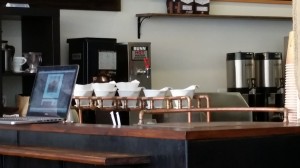1.
I just logged in to my blog service’s Dashboard, and I skipped over the option for it to “Remember Me”, which seems an indication that I and my blog service have fallen out of whatever relationship we had with each other back in the sunny days of January when I was blogging like once a week!
At any rate, I’m typing this from Fairfax, Virginia’s own 29th Parallel Coffee & Tea, which is in the strip mall by my sister’s, just down from a mattress store and a 7-11, and which specializes in the kind of slow, thin-streamed poursover I’ve somewhat solipsitically assumed were only an artifact of the Pacific Northwest. These kind:
But I’m not having coffee, I’m having a pot of tangerine ginger tea that I don’t so much enjoy as feel all right about drinking now that my acupuncturist has told me ginger is a smart food to put in my body so’s to assuage certain digestive troubles I’ve been having for a long time. I drink tea and have an acupuncturist and I do yoga once a week. What’s my name?
2.
On the plane over I read (in its entirety! in addition to watching three Portlandias!) Donald Antrim’s memoir, The Afterlife, which is both about the death of and dedicated to his mother. He spends lots of time throughout citing certain family-history data in something she once told him. But like get a load of this sentence that opens a paragraph toward the end of Part III:
My mother told me that the storage facility in which S. had deposited his Frederic Church—I had, I realize now, come to think of the painting as belonging to S.; and, with this in mind, and on the strength of hearsay evidence transmitted through channels that I knew from long experience to be unreliable (S. and my mother), had come to regard the painting as a genuine Church—the storage facility, as I was saying, was, according to my mother, very badly damaged.
It’s exactly the sort of exquisite Byzantine mess I like in a sentence’s form, but look also how that mess extends to its content. Twice therein we’re told this information came from his mother, before and after the long em-dashed appositive which explains that information (i.e. “hearsay evidence”) coming from his mother should be understood as unreliable.
The move’s rampant. I just flipped the book open to page 53 at random and found: “At the age of fifty-two, he died. My mother told me later that his weight had dropped precipitously, that he’d turned yellow, that, at the end, he’d bled through his skin.” Antrim could just as easily drop that “My mother told me later” bit and serve up his information as the reliable narrator we’ve long by now presumed him to be. But he pretty much never does.
Is this move a shirking of reliability on his own part? Are we to assume that anything preceded with “My mother told me” might be untrue? Or is this a kind of default self-policing regarding facts or moments Antrim thinks are testing our belief? Or maybe it’s a way to keep pushing his mother on the page, which makes sense given the project as a whole.
I didn’t love The Afterlife as much as I loved its sentences. I did appreciate its structure: seven parts that don’t follow chronology and cohere only in terms of the narrative voice and cast of characters. They’re not even all about his mother. It was great, but it was clear to me by the time I got to the end that anyone born after 1970 who tried to publish this book would be encouraged if not forced to do so as essays. I don’t have the book jacket on my library copy, but it’s great that there’s no clarifying subtitle anywhere in the book. That it’s allowed to just be a book.
3.
Because without question my anxious mother (who has a tendency to put the “mother” in “smother” [I kid!], and who knows I’m back in Virginia but won’t see me for another five days) had assumed from its title that this blog post was about her, I’ll apologize for any confusion here. Sorry, mom. See you soon. Stay tuned, four other readers, for a lot of blog posts in the coming days, most of them about television commercials.
